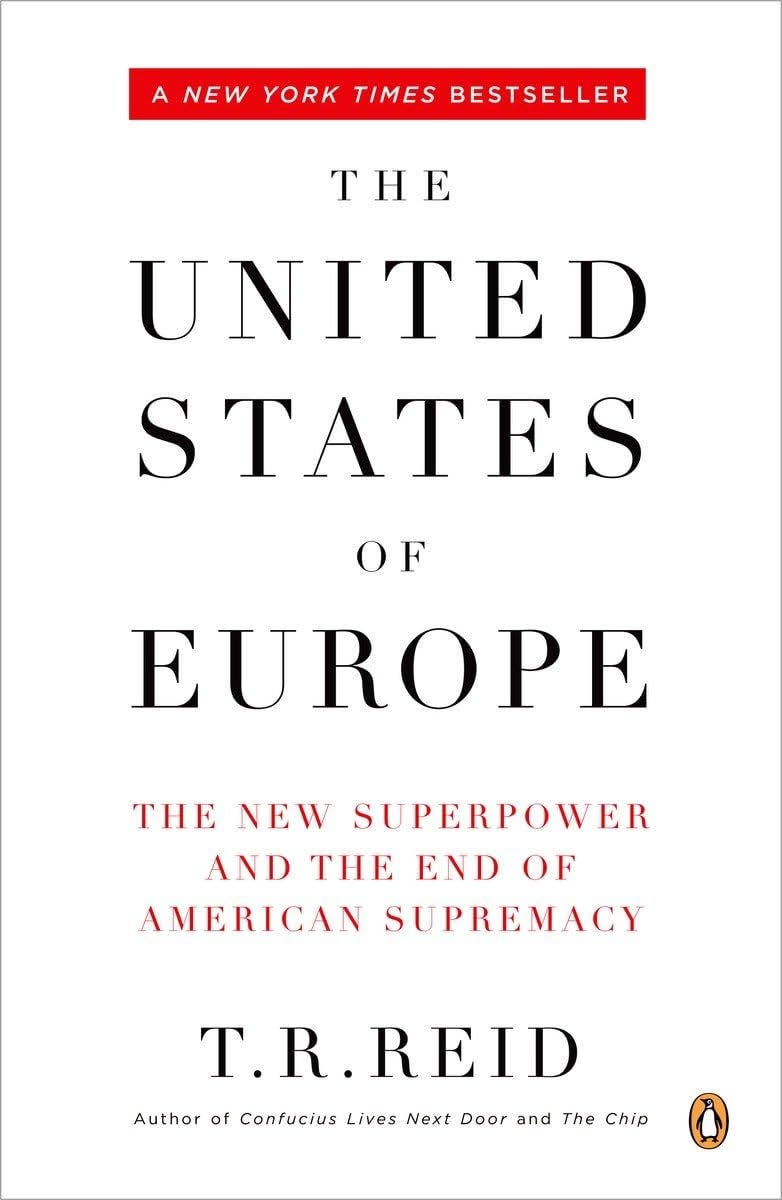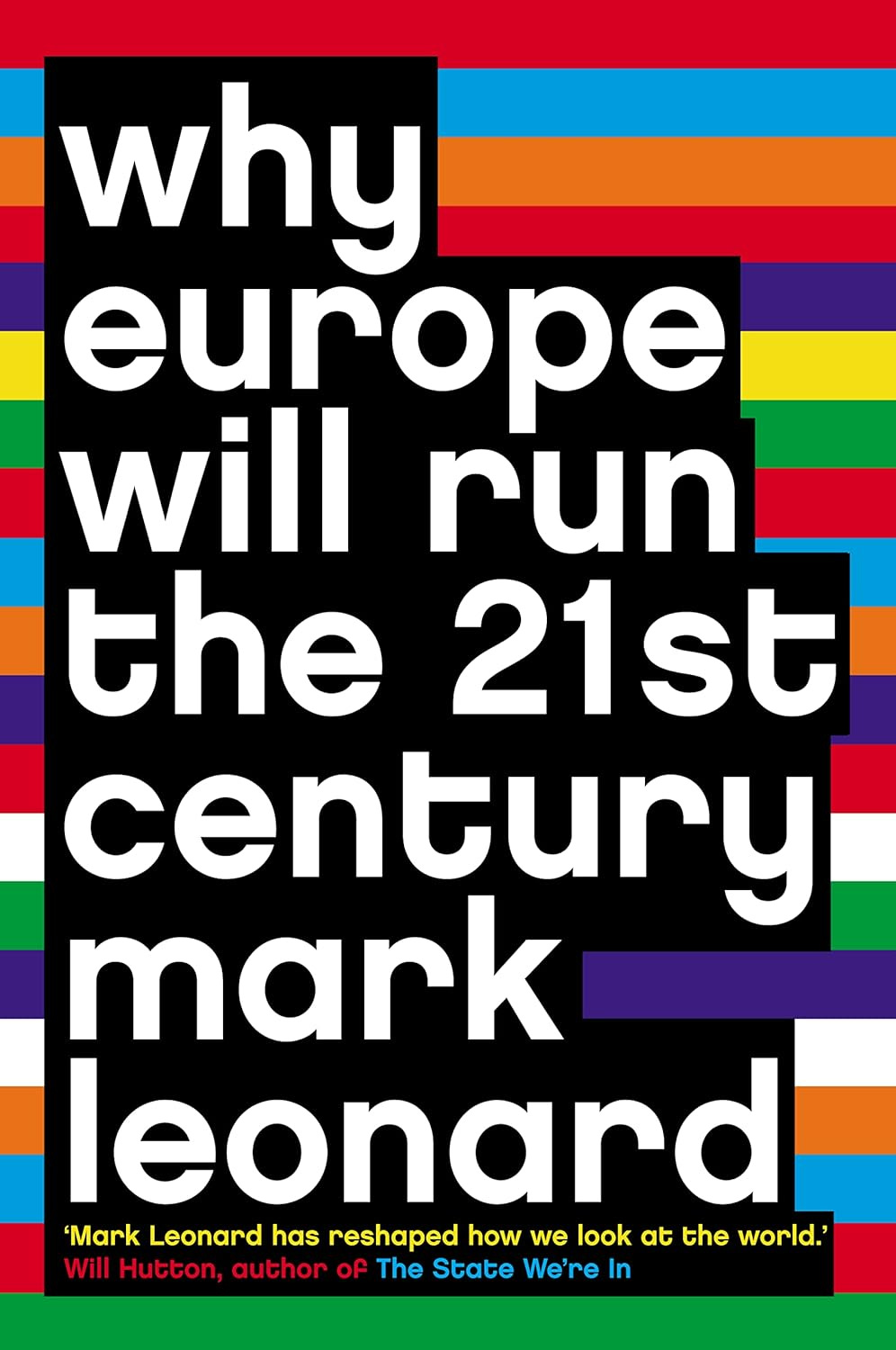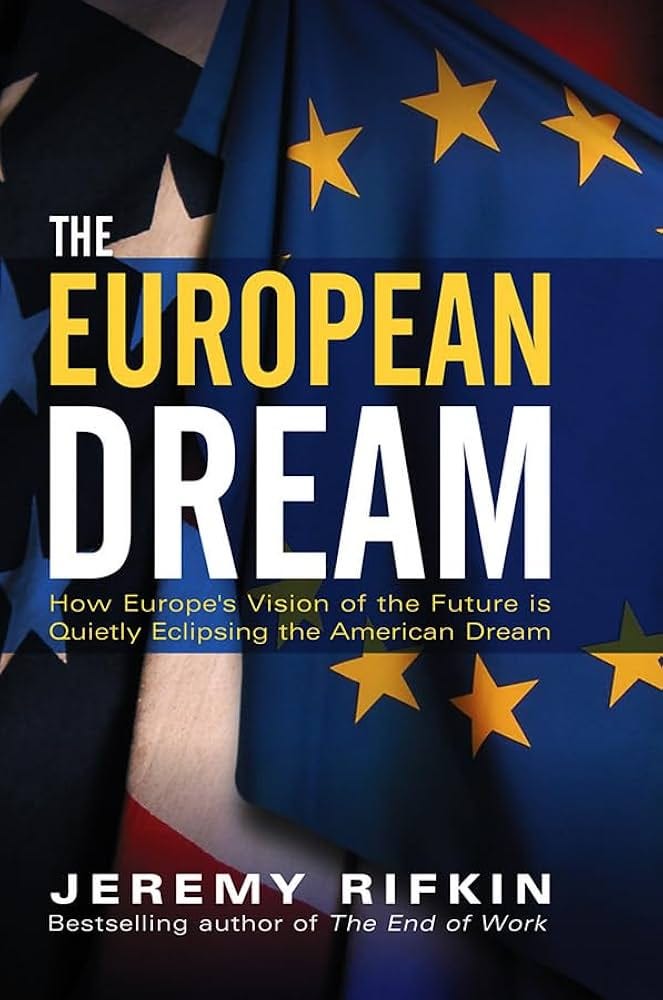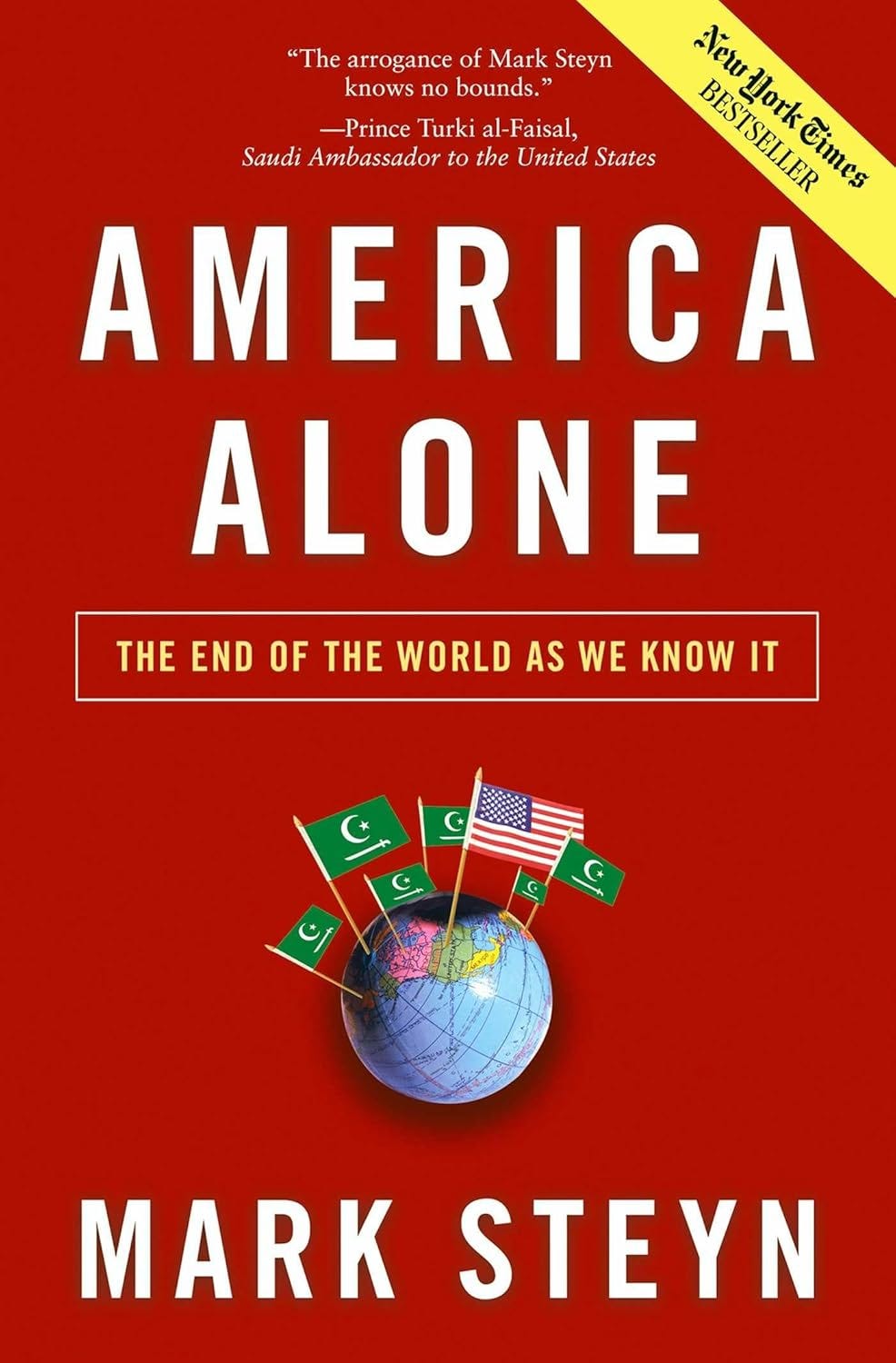Were the Neocons right?
Team America vs. the European Dreamers
Over on X, Richard Hanania flags T. R. Reid’s The United States of Europe as a book that has not aged well, given the Old Continent’s economic, demographic, and geopolitical travails of recent years (policy wonks call it the “polycrisis”).
Reid’s book was only one example of a thriving subgenre of political books from ~2003-2007 pitting Europe against the USA. This was a time when much of Western politics was defined by polarized reactions to U.S. President George W. Bush’s foreign policy of hard military power and unilateralism in the War on Terror, seemingly discredited by the disastrous invasion of Iraq.
This period in retrospect was also Peak EU—or rather Peak the Idea of the EU—in a lot of ways. In contrast to Bush the vulgar Texan cowboy, the Europeans embodied The Adults in the Room. Sure, their politics and conferences were not glamorous, but the Europeans appeared to be slowly and steadily getting things done. The European Union was being steadily built up as a trade and monetary power. The euro had been created the world’s second-most-important reserve currency. Airbus had broken American companies’ dominance of commercial airline manufacturing and was beginning to mog Boeing.
EU policymakers had also begun to flex their muscles in ways American leaders were disconcertingly unused to. In 2001, the European Commission in Brussels blocked General Electric’s takeover of Honeywell, which would have been a massive merger of two American companies, on antitrust grounds. In 2003, the Commission slapped retaliatory tariffs on American steel and forced the White House to back down from protectionist measures. The EU also provided a promising horizon: the Union was clearly still consolidating further as a bloc and being regularly “enlarged” with the addition of new country eager to enter the prestigious European club. Ten Central and Eastern European countries, most notably Poland, joined in 2004, followed by Romania and Bulgaria in 2007.
These trends inspired a cottage industry of bombastically euro-triumphalist books.1
The most popular and compelling of these was no doubt Jeremy Rifkin’s The European Dream, a book which was as much about the superiority of the European way of life (culture, food, well-being, environmental and social conscience…) as the EU as such. The European way was not only conducive to domestic well-being but thoughtful multilateralism, was building a new kind of superpower, one congenitally committed to peace and cooperation.
The period’s Euro-American Internet flamewars also inspired popular memes (though these were more likely to be shared on blogs and message boards than social media, also they weren’t call memes yet).
The pro-American side didn’t take all this lying down of course. Neoconservative (or just conservative) pundits criticized Europeans for being feckless, godless, and sterile. The Europeans were geopolitical freeloaders unwilling or unable to provide for their own security and always dependent on America. Europeans failed to have children, were burdened by ballooning welfare states and debts, and, more ominously still, were failing to integrate—let alone assimilate—steadily growing Islamic immigrant communities across the continent. Perhaps the most cutting argument was that West European nations had become entitlement societies where the classical notion of civic virtue had whithered away. The European would not have children, would not fight for his country, and would not even pay his or her own way in life, or seemingly do anything for the survival of the body politic. Robert Kagan and Mark Steyn are probably the most important representatives of this genre.
In retrospect, it seems fair to say that both sides had it right—and wrong. Against the Neocons, the fact is that American techno-military prowess was squandered in their two chief international projects: the wars in Afghanistan and Iraq. These resulted in the deaths of hundreds of thousands of people at a mind-boggling cost of $4-6 trillion (the U.S. national debt is now over $35 trillion or over 120% of GDP). Two decades later, after a humiliating U.S. withdrawal, the Taliban is again ruling in Afghanistan. Iraq for its part, after tremendous bloodshed and ethno/religious civil war (which included some 5 million people fleeing their homes), has stabilized as a multiparty democracy, albeit one with signifiant Iranian influence (likely not what the Neocons had hoped).
Most would now admit that the United States should not get in the business of “nation-building” and trying to socially engineer such radically different societies into modern Western-style democracies. (Although I recently listened to an interview with Paul Wolfowitz who, two decades later, is still justifying the Iraq War on the basis of 9/11.)
The European Dreamers, for their part, had oversold their case. There was by no means a unified European position in favor of peace and multilateralism. While Germany, France, and Belgium had opposed the invasion of Iraq, many more countries participated in the invasion and/or occupation, including Great Britain, Italy, Spain, Poland, Romania, the Netherlands, Portugal, Czechia, Bulgaria, the Baltic states, and others. In foreign and defense policy, there would continue to be powerful incentives for national governments to prioritize bilateral collaboration with the United States over European cooperation.
It is true that most people in western Europe opposed the invasion of Iraq, whatever the actions of their governments. Massive protests against the invasion took place across the continent. Writing in Le Monde, the French Socialist politician Dominique Strauss-Kahn declared that “a new nation is being born in the street. And this new nation is the European nation.” But a generation’s momentary common revulsion towards American foreign policy did not a nation make.
The European Dreamers radically underestimated the continued salience of the nation-state in both of its components, namely how the persistence of national identities and state interests would hamper the functioning of the EU’s decidedly baroque architecture. As was known by many economists but not commentators at large, the flawed design of the Eurozone had made participating countries particularly vulnerable to inevitable economic surprises.
American critics’ arguments were probably most right concerning economics and especially demographics. Subreplacement fertility combined with the welfare state eventually means not only a steady decline in native economic capacities, but chronic fiscal crisis. Contra immigrationist pieties, low quality immigration actually makes this worse because this tends to be a net fiscal burden. Economic stratification and political polarization along racial lines, which sophisticated Europeans had once thought was the purview of the (racist) Americans, are now characteristic features of just about every western European society. European political debates now often center on the clashing issues of immigration (legal and illegal), migrant-origin crime, Islamic terrorism, and anti-Semitism on the one hand, and Islamophobia and racism on the other.
In the end, the U.S. was much better equipped to bounce back from crises like the 2007-8 financial crisis and the COVID-19 pandemic than the Europeans were. The economic-demographic-technological-institutional foundations of U.S. power were comparatively much more robust.
By contrast, since 2010 the EU has stumbled from one crisis to another: the Eurozone sovereign debt crisis, the 2015 migrant crisis, Brexit, the COVID crisis, and now the war in Ukraine and associated economic and energy disruption. The cumulative effect of these crises has been a steady deterioration of Europe’s economic position, notably compared to the U.S. Whereas the EU and U.S. economies were basically equal in size in 2010, the American economy is now about 50% bigger. Europe’s inferiority is accumulating in cutting-edge sectors like tech, biotech, AI, and space. The Old Continent has even fallen behind in areas where it used to still lead, like pharma.
A lot of these adverse trends are structural and institutional. Europe is a small continent poor in natural resources and managing a multinational polity like the EU was never going to be easy. Nonetheless, if you want to blame anyone for Europe’s poor condition today, I would suggest Angela Merkel. The German chancellor was the most influential politician in Europe until she left office in 2021 and played a significant role in each of these crises. Though Merkel portrayed herself as the ultimate Adults-in-the-Room responsible-to-the-point-of-boring politician, she was prone to the most erratic and counter-productive decisions. The decision to shut down nuclear power in Germany after the Fukushima incident as part of the Energiewende—which increased European energy dependence, has kept CO2 emissions higher,2 and was forecast to cost €1 trillion—was characteristic of her brand of stolid virtue signaling.
With Russia’s invasion of Ukraine, U.S. predominance over Europe is here to stay. European nations are military, technological, cultural, and energy dependencies of the United States and there is no indication this will change. If anything, given current and foreseeable trends, the situation will probably worsen. The European Council on Foreign Relations (ECFR, a pro-EU and pro-U.S. think-tank) has complained the Europeans are now so weak that the situation is one of “vassalization” to America.
At the same time, Americans should not get too cocky. Polls suggest that the new generation of Americans’ notion of civic virtue is converging with Europeans’, with declining attachment to patriotism, religion, family values, and community involvement. America’s total fertility in 2023 was 1.61 per woman, only slightly above the EU’s 1.46 in 2022. If Americans are not careful, the United States could also face stagnation in the near future.
If there is a common thread between American Neoconservatives and European Dreamers, it is that both radically overestimated the ability of distant political authorities to transform diverse societies. The Neocons highlighted genuine problems in European societies but this served mainly to distract from their own catastrophic Jacobin-like revolutionary foreign policy of imposing liberal-democracy through force on low human capital and highly tribal Islamic nations. As it happens, American “nation-building” efforts have consistently failed south of the 36th parallel north.
The European Dreamers, somewhat more modestly, thought the differences between European nations would be papered over by belonging to common economic and legal institutions. This proved just as unrealistic. European politics continues to be powerfully defined by differing state interests and separate national identities, solidarities, debates, and political rhythms. State and ethnos remain irreducible facts of political life, notwithstanding the many, many people who would like to wish these away. To the extent Europeans have a common culture, it tends to be American, defined by American music, TV shows, films, streaming services, books, and academia. Regional disparities between northern, western, southern, and eastern Europe have continued to be well entrenched, and in the case of southern Europe have significantly deepened with the euro crisis.
If there is a lesson to be drawn, I would say that political leaders and policymakers need to be extraordinarily sensitive to the particular conditions and realities of different societies, and more humble in their ambitions to transform them. Again and again, the assumption, based on abstract principles, that societies are basically the same or naturally convergent, leads to unnecessary disasters.
It is noteworthy that the most popular euro-triumphalist books were written by Anglos. Continental Europeans like Jürgen Habermas and Dominique de Villepin also wrote in this debate, but their positions seem to have been more cautious.
Over a decade after the launch of Merkel’s Energiewende, per capita carbon emissions in Germany are still almost twice that of nuclear-powered France.










This post takes me back. I briefly wrote about this debate in a retrospective on my time in the US back in 2016: https://akarlin.com/american-decade/
> Perhaps the most quintessential case for this was made by T.R. Reid’s book The United States of Europe. He argued that the EU was emerging as a superpower rivaling the US, held together by an emerging “Generation E” of yuppies from Paris to Berlin (soundtrack) that saw themselves as Europeans first and were rapidly integrating through the trifecta of Eurovision, Erasmus scholarships, and Eurail (much more eco-friendly than the American Canyonero!).
That said, terminally premature as the Eurotriumphalism was, it might not have been all wrong - I do think we have something like the ethnogenesis of a European nation occurring amongst the yuppies of the big European cities, and now spreading outwards.
Europeans are integrating fairly well amongst themselves. the immigration debates have solely to do with African/Arab migrants.